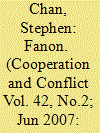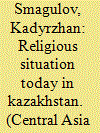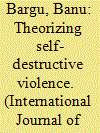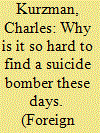| Srl | Item |
| 1 |
ID:
077426


|
|
|
|
|
| Publication |
2007.
|
| Summary/Abstract |
Frantz Fanon has always been read as an apostle of violence - much of this owed to Sartre's Preface to Fanon's work, The Wretched of the Earth. There are, however, more nuanced possible readings of Fanon, readings that allow the possibility of new understandings of contemporary violence emanating from the Middle East. In this article, Fanon's intellectual trajectory is traced back to his first writings postulating an equality in which no slaves existed by virtue of there being no longer any masters. The psychological dimensions of Fanon's work are discussed and a hypothesis put forward about a moment of pure psychological lucidity and calm before the suicide bomber of today explodes his or her device. The work of Lacan and Kristeva is discussed in relation to a nuanced reading of Fanon, and an excursion into the Palestine of Hamas helps complete a complex meditation on Fanon's life and work
|
|
|
|
|
|
|
|
|
|
|
|
|
|
|
|
| 2 |
ID:
138775


|
|
|
|
|
| Summary/Abstract |
Suicide terrorism is the most violent and horrifying form of terrorism in the world today. This kind of terrorism causes many fatalities and can throw an entire nation into a state of panic. We usually attribute this kind of terrorism to altruistic motivation, assuming that bombers are willing to sacrifice themselves for a higher cause. The current study uses the criminological theory of Rational Choice to analyze the motivation of jihadist suicide terrorism. By reviewing the religious, personal, and social incentives, we demonstrate that even those who kill themselves in suicide attacks, which are seemingly examples of irrational or altruistic behavior, do so while considering future, self-gratifying benefits. Since this self-destructive behavior is mostly driven not by altruistic motivation but by the anticipation of costs and benefits, we find that there is no fundamental difference between the perpetrators’ motivations and those of other criminals; both groups are committed to maximizing self-gratifying, beneficial behavior.
|
|
|
|
|
|
|
|
|
|
|
|
|
|
|
|
| 3 |
ID:
118764


|
|
|
| 4 |
ID:
109674


|
|
|
| 5 |
ID:
172160


|
|
|
|
|
| Summary/Abstract |
In recent years, the number of suicidal terror attacks in advanced societies has decreased, inducing the public to widely remove the issue from public post-modern debate. Yet as, among many other examples, the attacks on a church in Sri Lanka’s capital Colombo in April 2019 with more than 250 dead and 500 wounded have shown, the age of suicide terrorism is far from over. On the contrary, the archetype remains one of the most present influences in the unconscious imaginary of globalisation, including that of open societies. We shouldn’t forget that we still have a lot of work to do in order to better understand and solve the problem, writes Roland Benedikter.
|
|
|
|
|
|
|
|
|
|
|
|
|
|
|
|
| 6 |
ID:
124491


|
|
|
|
|
| Publication |
2013.
|
| Summary/Abstract |
The first image that the question of violence in the Middle East conjures up, especially in the West, is that of the suicide bomber. This association, etched into the political imaginary particularly over the course of the last two decades, is due neither to the number of victims suicide bombing creates (more conventional weapons of war can claim as many or more victims), nor to the identity of its victims (conventional weapons are also often directed at civilians). Rather, the potency of the image of the suicide bomber is connected to the simultaneously self-destructive and other-directed form that this act of violence takes. If the Orientalist impulse that has raised the image of the suicide bomber to iconic status is deeply problematic, it nonetheless constitutes an involuted acknowledgement of a reality: the significant rise in self-destructive violence (and not just in the Middle East). I have in mind practices such as hunger striking, self-immolation, and fatal self-mutilation, which constitute an emergent repertoire of struggle that has come to mark a certain current of radical politics around the globe. Those modalities of self-destructive violence that are not directed at others are overshadowed by suicide bombing.
|
|
|
|
|
|
|
|
|
|
|
|
|
|
|
|
| 7 |
ID:
109236


|
|
|